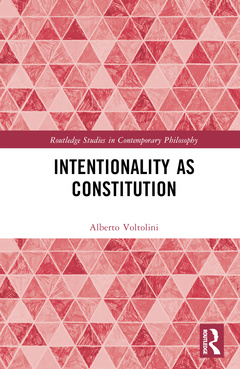Intentionality as Constitution Routledge Studies in Contemporary Philosophy Series
Auteur : Voltolini Alberto

This book develops a novel theory of intentionality. It argues that intentionality is an internal essential relation of constitution between an intentional state and an object, or between such a state and a possible state of affairs as subsisting.
The author?s main claim is that intentionality is a fundamentally modal property, hence a non (scientifically) natural property in that it does not supervene, either locally or globally, on its nonmodal physical basis. This is the property, primarily for an intentional mental state, to be constituted by the entities it is about. In the case of intentionality of reference, such constituents are objects, in the sense of individuals; in the case of intentionality of content, such constituents are possible states of affairs as subsisting. Constitution is meant in a mereologically literal sense: those constituents are essential parts of the relevant states. As a result, the theory claims not only that intentionality is relational but also that it is an internal, essential relation holding between an intentional state and its object or proposition-like content.
Intentionality as Constitution will be of interest to scholars and advanced students working in philosophy of mind, philosophy of language, metaphysics, and cognitive science.
Introduction: The Structure of Intentionality 1. What Intentionality Metaphysically Is Not – I 2. What Intentionality Metaphysically Is Not – II 3. The Core Theory 4. How the Core Theory Fits the Adequacy Conditions 5. The Extended Theory and How It Fits the Adequacy Conditions 6. Intentionality and Its Role in the World 7. Intentionality and the Mark of the Mental Conclusion
Alberto Voltolini (PhD Scuola Normale Superiore, Pisa 1989) is a philosopher of language and mind whose works have focused mainly on intentionality, depiction and fiction, perception, and Wittgenstein. He is currently a Professor of Philosophy of Mind at the University of Turin (Italy). He has received scholarships at the Universities of Geneva and Sussex. He has been a visiting professor at the Universities of California, Riverside (1998), Australian National University, Canberra (2007), Barcelona (2010), London (2015), Auckland (2007, 2018), and Antwerp (2019). He has been a member of the Steering Committee of the European Society for Analytic Philosophy (2002–2008), of the Board of the European Society for Philosophy and Psychology (2009–2012), and of the International Society for Fiction and Fictionality Studies. He is presently President of the Italian Society for Analytic Philosophy. His publications include How Ficta Follow Fiction (2006), as well as the “Fictional Entities” and the “Fiction” entries (with F. Kroon) of the Stanford Encyclopaedia of Philosophy, A Syncretistic Theory of Depiction (2015) and Down But Not Out (2022).
Date de parution : 06-2024
15.2x22.9 cm
Thème d’Intentionality as Constitution :
Mots-clés :
Alberto Voltolini; intentionality; constitution; mental states; intentional objects; philosophy of mind; naturalization; unconscious property; intentionality of reference; object/content relation; phenomenal intentionality; normativity; intentional behavior; aspectuality; argument to best explanation



